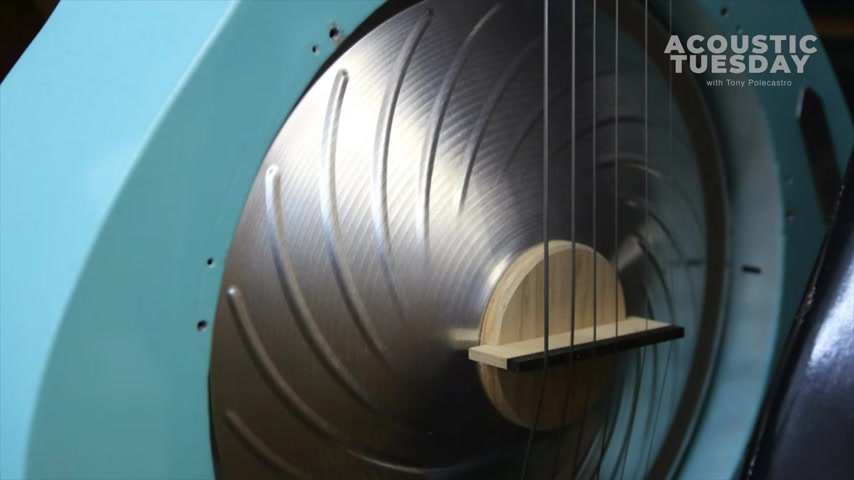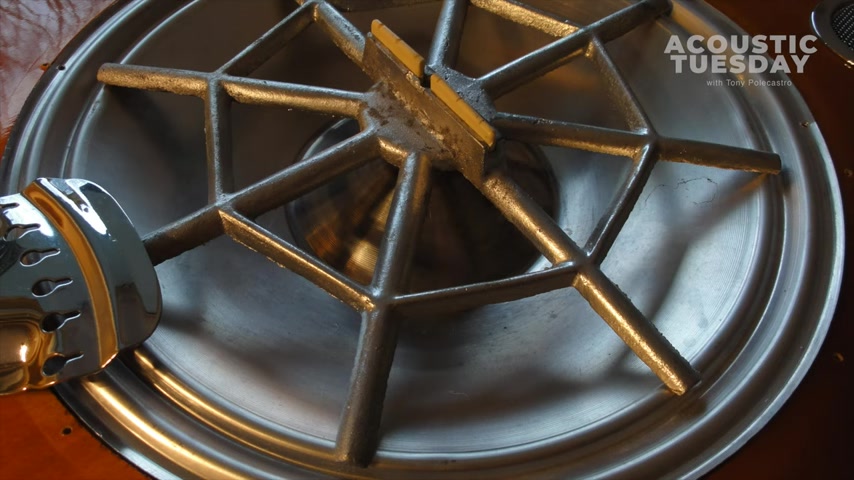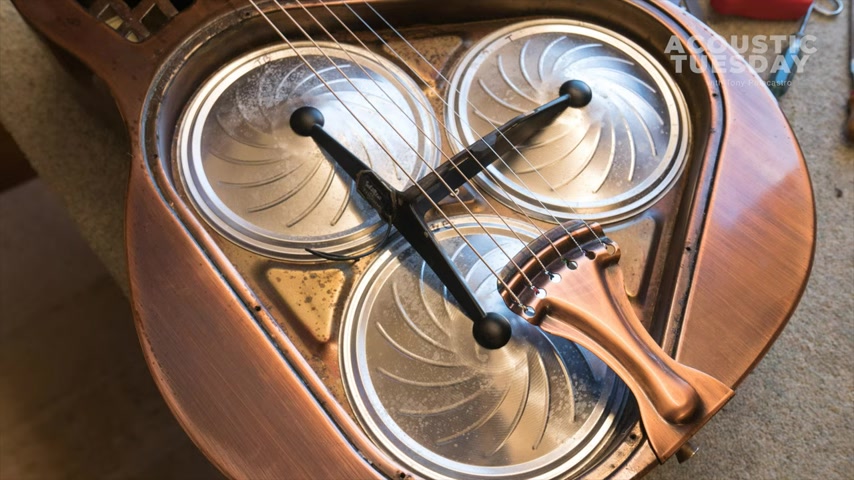https://www.youtube.com/watch?v=MoBJuw7PACo
Your QuickStart Guide To Resonator Guitars

First up on my list today is your Resonator Guitar Survival Guide .
Ok .
Because I think there's a lot of myths surrounding resonator guitars .
And it's like , oh , well , I can't , I can't play a resonator guitar .
I'm not good enough or I can't play a resonator guitar because I don't play slide or I can't play a resonator guitar because I have to learn a whole new style of play .
That's just not true because resonator guitars , you can tune them to standard tuning and play everything that , you know , on a regular guitar , on a resonator guitar and it's gonna sound awesome .
It's another , it's another sonic flavor to add to your arsenal .
So I wanna discuss Resonator guitars today because I want you to be able to walk into your local guitar store or shop online and know what you're looking at and be confident enough to give them a shot because they're really fun .
I mean , Resonator guitars are truly magical instruments .

So let's dig in the first choice that you're gonna need or the first choice that you'll be confronted with when it comes to Resonator guitars is neck type .
Ok .
Now , what I'm talking about here is the actual profile of the neck .
You're either gonna see a round neck resonator guitar or a square neck resonator guitar .
And luckily for us here , I've got both on hand .
This is a round neck if I can get out of the stand .
This is a round neck resonator guitar .
The neck is round .
You play it like the standard guitar .
OK .
This over to my right is can get this one out of the stand is a square neck resonator guitar .
You can't fret .
I mean , you , you literally can't fret this .
The , the nuts sitting the in the , the strings are about a half inch off the fret board and square neck resonator guitars are made to play flat in your lap .
So think um like Dobro style or like bluegrass dobro .

Um Sometimes people call it lap slide .
All of those names .
Suffice for a square neck resonator guitar .
So first choice round neck or square neck , square neck is exclusively for lap style playing round neck .
You can play your standard stuff , uh , that you play on your normal guitar or you can play with a bottleneck slide or something like that .
Ok .
So now that we got that out of the way , now let's get into the meat and potatoes of the dish , ok ?
Because Resonator guitars have resonator systems in them .
That's what help them make the sound that they do and you're probably gonna run into three of the most common resonator systems when you're out there looking at resonator guitars .
And I want you to be able to tell the difference between the two and I want you to be able to hear the difference between , I'm sorry , between the three , I said two , there's three .

So let's start with the most common resonator system and that is a single cone resonator that is of a biscuit style .
OK .
Now you're gonna be looking at a picture and you'll see that the single cone resonator , it's like a aluminum speaker cone that's pointed inside the guitar's body and the strings go over this wooden saddle that sits on top of a wooden disk and that's lovingly referred to as the biscuit .
Now , these particular guitars sound extremely distinct because they're , they're very barky .
They have this beautiful kind of thump and , and really strong projection , but they decay really quickly .
They don't have a ton of sustain .
They may have a little bit more sustain than a standard flattop acoustic guitar .
But in the resonator guitar world , single cone biscuit style resonators have a very quick decay .
So they're really good for slide .
They're great for blues .
Uh If you , if you find yourself , uh , finger picking like rag Timey or real Thumpy blues .

A single cone biscuit style resonator is the one that I definitely think you should check out .
And it's probably the most common out there .
If you look at many national guitars , oftentimes they are a single biscuit cone style guitar .
In fact , the one that I have here next to me is a single cone biscuit style resonator guitar .
This is a uh a super Collegian that was actually made by National and under the hood .
It is a single cone biscuit style resonator and it has just a beautiful thumb , just a really nice projection , good , strong sustained , rather , I'm sorry , good , strong projection , but a little bit shy on the sustained end of things .
Uh So the notes die pretty quickly , but they're very strong right off the get go .

The next resonator style that you're gonna run into is called a Spider bridge or a spider cone resonator style .
Now , this particular resonating system is a lot different than the biscuit style because the cone is actually inverted .
The cone of a spider bridge is actually outward like much like a speaker .
So think of the guitar as a speaker cabinet and that aluminum resonator cone is shooting out .
And on top of that resonator cone looks like , uh actually looks like a spider web and the strings go across that on top of a wooden saddle .
I happen to have an example of a spider cone bridge here .
And this is my beard bell beard guitar , uh from the front , you , you'd never be able to know .
But if you look under the cover plate , you'll start to see that spider web kind of bracing system that the saddle sits on and that is what indicates a Spider bridge resonator guitar .
These guitars are common on square neck guitars , obviously .

Um , and also round neck and what's significant about these Spider Bridge resonating systems is that they're very long unsustained .
They're very good at note articulation .
They're really lush and huge sounding .
They might not be as loud as a single cone biscuit style resonator guitar , but for what they lack in volume , they make up for in sustained .
So if you like doing slide really long kind of sensitive uh passages , if you will uh Spider bridge resonator guitar would be a great option for you .
And last , but certainly not least , probably the most intimidating of all the resonators is a tri cone .
OK .
So a tri cone as the name suggests is three resonators .
There's 3 10 inch resonator cones kind of oriented like the biscuit style or resonator , but they're three , right ?

There's two on the base end of the side , uh the base side of the guitar and a single one on the side of the guitar and running across them is a metal or like a cast aluminum T and that's what the strings actually run over .
Now , the beautiful thing about tri cones is that they actually marry the bark of a single cone biscuit and the sustain of a Spider bridge resonator .
So you get this beautiful projection , this strong projection , but also this nice long uh tail on the note , they're great for slide , awesome for alternate tunings .
And I actually happen to have one here .
This is a Mule tri cone and from the front , you'd say , well , tone , that's not much of a tri cone , but this is actually modeled after a 1927 national where they put a tri cone resonating system in a single cone body more on this guitar here in a second .
In fact , you'll be able to hear it much better than um if I played it with this microphone .
So that's , that's the basics of resonator guitars .
Can you play a resonator guitar right now ?
Absolutely .

You don't need any special skills .
You just need to want to make beautiful sounding music and grab a resonator guitar and you absolutely will be able to just a quick run over again .
So neck profile is , is the first option you're gonna run into , uh you're gonna run into round next or square , next square , next are exclusively lap style playing and round next , you can do pretty much whatever with and then you go into the resonating systems .
You've got a single cone biscuit bridge which is real barky think , single cone biscuit for bark .
Then you have a spider bridge , resonator think spider bridge for smooth and sustain .
And then you have a tri cone which is kind of that , that middle ground of sustain and bark .
And uh you're actually gonna hear somebody play a tri cone here when we get to who I'm listening to this week .
But I digress , I want you to now be able to go into your local guitar store and con take a resonator guitar off the wall .
Be able to look inside it and know what you're looking at .
More importantly , be able to play it and have fun with it because it's resonator guitars are so cool .

It's like an instant sonic addition to your guitar arsenal and you don't have to learn anything new .
It just sounds amazing .
Are you looking for a way to reach a wider audience and get more views on your videos?
Our innovative video to text transcribing service can help you do just that.
We provide accurate transcriptions of your videos along with visual content that will help you attract new viewers and keep them engaged. Plus, our data analytics and ad campaign tools can help you monetize your content and maximize your revenue.
Let's partner up and take your video content to the next level!
Contact us today to learn more.